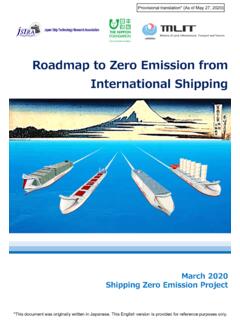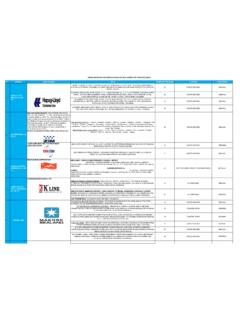Transcription of Call to Action for Shipping Decarbonization
1 Call to Action for Shipping DecarbonizationThe Call to Action was developed by a multi-stakeholder task force convened by the Getting to Zero Coalition with members from the entire maritime ecosystem including Shipping , chartering, finance, ports, and fuel production. The Call to Action was delivered to world Governments in November 2021, in advance of are seeking supporters for the Call to Action from all parts of the maritime value chain, and all companies committed to Decarbonization that use Shipping in their supply chains. Supporters should be committed to taking concrete actions to make zero emission vessels and fuels the default choice by 2030, and supporters are requested to share their company commitments in support of the Call to Action . For more information, please contact to Action for Shipping DecarbonizationShipping must align with the Paris Agreement temperature goal and be run entirely on net-zero energy sources by 2050.
2 The signatories to this call to Action firmly believe an urgent and equitable Decarbonization of the maritime supply chain by 2050 is possible and necessary. The private sector is leading the way and taking concrete actions to make zero emission vessels and fuels the default choice by 2030, and decisive government Action and enabling policy frameworks are needed now to reach our 2030 and 2050 a target for zero emission Shipping by 2050 Shipping and the maritime ecosystem need to align our climate ambitions and actions with science1 and the Paris Agreement s temperature goal. Countries representing more than 65 percent of global GHG emissions and more than 70 percent of the world economy2 as well as many companies have already committed to achieving carbon neutrality by or around This creates a strong and growing imperative for all industries to decarbonize or face existential business transport 80 percent of global trade and the maritime supply chain delivers the services needed to run our societies.
3 Whilst this is done with the lowest carbon footprint of any mode of transport per ton transported, Shipping still accounts for about three percent of global GHG 2018, the International Maritime Organization (IMO) set an ambition for Shipping to reduce its GHG emissions by at least 50 percent by 2050 compared to 2008. This was an important first step, but given technological developments and the latest climate science, it is now time to set a clear target for the Shipping industry to be run entirely on net-zero energy sources by Deploy commercially viable zero emission vessels by 2030 Raising our long-term climate ambition is not enough. Urgent Action starting now is fundamental to achieving the transition to zero emission Shipping by 2050. By 2030, we must reach at least five percent zero emission fuels in international shipping6 and have commercially viable zero emission vessels operating along deep-sea trade routes, supported by the necessary infrastructure for scalable zero emission fuels and energy sources7 including production, distribution, storage, and these 2030 targets will require collaboration across the maritime ecosystem and with governments on the following.
4 Refining zero emission technologies to ensure safety, reliability, and sustainability While the technologies needed to build zero emission vessels and produce zero emission fuels and propulsion systems exist, they need to be further developed to ensure that they are safe, clean, and This will require further refining both the vessel and fuel production technologies and creating clarity around safety, sustainability, regulation, training, fuel and vessel life-cycle analyses,10 and fuel availability, thereby reducing the risks associated with investing in zero emission vessels, infrastructure, and fuel industrial scale demonstration projects involving the full value chain We must implement industrial scale demonstration projects involving the full value chain. Such demonstration projects will show that zero emission Shipping is viable at scale, while driving down costs and scaling up demand to enable broader deployment.
5 Demonstration projects will entail higher risks and higher costs and will need to be de-risked through private sector collaboration, innovative business models, and government the competitiveness gap through policy actionDespite the potential to significantly reduce the cost of zero emission fuels over the coming decade, it will not be enough to close the competitiveness gap with fossil fuels. This means that the market alone will not be able to make zero emission Shipping commercially viable at the required scale. By 2025, policy makers must therefore put in place clear, effective, and equitable policy frameworks, such as meaningful market-based measures,12 to make zero emission Shipping commercially viable. Unlocking global growth opportunities and synergies with other harder-to-abate sectors Meeting the future demand for zero emission Shipping will require massive investments,13 especially in the production of zero emission fuels.
6 This creates new growth and job opportunities14 not least in developing countries and emerging economies that must be unlocked to achieve an equitable transition. As Shipping Decarbonization is part of the global energy transition, we must also work with other harder-to-abate sectors to reap synergies that can accelerate the transition by creating economies of scale and reducing sector Action must go hand-in-hand with government actionWe, the signatories, are already taking concrete actions to support the Decarbonization of Shipping and help us achieve our goals this decade and by This includes investing in RD&D and pilot projects, ordering and building zero emission ready vessels, buying zero emission Shipping services, investing in the production of net-zero emission fuels, investing in port and bunkering infrastructure, assessing and disclosing the climate alignment of Shipping related activities, and much private sector is leading the way.
7 However, the Decarbonization of Shipping can only happen with the urgency and scale needed if national governments and international regulators establish policy frameworks that make zero emission Shipping and fuel production commercially viable, investable, equitable, and therefore call on governments to: 1. Commit to decarbonizing international Shipping by 2050 Set an unambiguous target to decarbonize international shipping18 by 2050 and deliver a clear, achievable, and equitable implementation plan to achieve this when adopting the IMO GHG Strategy in 2023. 2. Support industrial scale zero emission Shipping projects through national Action Support industrial scale demonstration projects addressing vessels, port infrastructure, and fuel production to de-risk first movers and accelerate innovation starting now, for instance by setting clear Decarbonization targets for domestic Shipping and providing incentives and support to first movers and the broader deployment of zero emissions fuels and Deliver policy measures that will make zero emission Shipping the default choice by 2030 Adopt policy measures, including meaningful market-based measures, taking effect by 2025 that will support the commercial deployment of zero emission vessels and fuels in international Shipping and make ordering zero emission vessels the default choice no later than.
8 We are taking critical steps to deliver commercially viable zero emission vessels with the necessary supporting infrastructure and fuel production by 2030. We are encouraging others to join us. To deliver decarbonized Shipping by 2050, without which it will be impossible to decarbonize global supply chains and the global economy, we call upon world leaders to work together with the private sector to deliver the right enabling environment with clear and unambiguous timelines and regulations. With this, we can commit to an equitable Decarbonization of the maritime supply chain by Moller-MaerskABB Alfa LavalAnglo American Algeciras Bay Port AuthorityAnemoi Marine TechnologiesAnglo-Eastern Univan GroupAtlantic Bulk Carriers ManagementAuramarineAutoridad Portuaria de ValenciaBBerge Bulk Bernhard Schulte ShipmanagementBHPB ibby MarineBlue Star GroupBollor LogisticsBP ShippingBritoil Offshore Services BungeBunker Holding GroupBureau VeritasBW LPGCC argill Ocean TransportationCaribbean Feeder Services Carnival CorporationCIMACCitiClassNKCMBCOACH SolutionsCompanhia de Navega o NorsulCopenhagen Malm Port3 Credit Agricole CIBDD aewoo Shipbuilding & Marine EngineeringDanaos ShippingDanish Ship FinanceDB SchenkerDFDSD iana ShippingDNB BankDorian LPGDowDrewry Shipping ConsultantsEEagle BulkEchandia MarineEnetiENGIEE ssberger & Stolt
9 TankersEuronavEV MaritimeFFleet Management LimitedFortescue Metals Group & Fortescue Future IndustriesForward ShipsF rstenberg Maritime AdvisoryGGAC GroupGard GasLogGenco Shipping & TradingGlobal Ship LeaseGrimaldi GroupHHamburg Port AuthorityHapag-LloydHarren & Parter GroupHeerema Marine ContractorsH egh AutolinersH egh LNGII berdrolaICE Marine DesignINGKK awasaki Kisen KaishaKirby CorporationKuehne+Nagel InternationalLLatsco Marine ManagementLauritzen BulkersLiberty Pier Maritime ProjectsLinsen Nambi Bunker ServicesLiquid WindLloyd s RegisterLouis Dreyfus CompanyMMabanaftMaersk BrokerMaersk TankersMAN Energy SolutionsMarine CapitalMaritime Strategies International (MSI)MISC Group of CompaniesMitsui & LinesMontreal Port AuthorityMPC Container ShipsMSC CruisesMSC Mediterranean Shipping CompanySignatoriesCompaniesNNAPAN ewport ShippingNordenNorsepowerNorthwest Seaport Alliance Nova Marine CarriersNYK Line ( nippon yusen Kabushiki kaisha )
10 OOccidental Ocean ConservancyOcean Network ExpressOceanic Investment ManagementOdfjellOlympic Shipping and ManagementOrbitMIPP acific Basin Shipping Panama Canal AuthorityPeninsulaPole StarPort EsbjergPort of AmsterdamPort of AntwerpPort of BarcelonaPort of GothenburgPort of KielPort of London Authority Port of Rotterdam AuthorityPort of SeattlePort of AarhusPorts of Bremen / BremerhavenPrecious ShippingProbunkersPSA International Purus MarineQQuincannon AssociatesRRenewable Hydrogen RightShipRio TintoRobert BoschRoyal Belgian Shipowners AssociationRoyal Caribbean GroupSSaga Shipholding (Norway)Scorpio TankersSDTR Clean EnergySiemens EnergySiemens Gamesa Renewable EnergySkuldSoci t G n raleSolomon Islands Ports Authority Solstad Offshore SovcomflotSparebanken VestStar Bulk CarriersStena BulkStephenson HarwoodStorebrand Asset ManagementSumitomo Mitsui Trust BankSwire Bulk Swire Shipping Swiss ReSynergy Marine GroupTTaylor Maritime TB Marine ShipmanagementTCI GECOMP The Caravel GroupTHRUST (a program by Enviu)4 TORMT orvald KlavenessTrafiguraTransport TransformationTufton Investment ManagementUUltranavUnifeeder UnileverVV.







